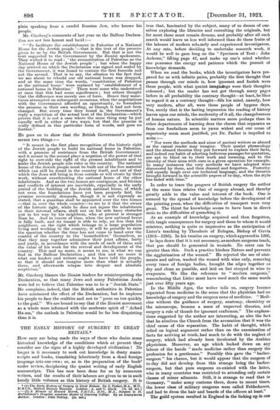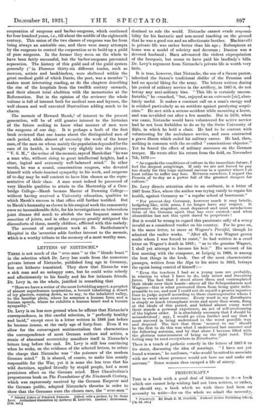THE EARLY HISTORY OF SURGERY IN GREAT BRITAIN.* How easy
are being made the ways of those who desire some historical knowledge of the conditions which at present they consider are the signs of a highly developed civilization ! No longer is it necessary to seek out knowledge in dusty manu- scripts and books, translating laboriously from a dead foreign language into our own; or, as in the preparation of the books under review, deciphering the quaint writing of early English manuscripts. This has now been done for us by numerous writers, and the results of their labours are given to us in such handy little volumes as this history of British surgery. It is
• CO The Early History of Surgery in Great Britain. By G.Parker,M.A., M.D., Medical History Manuals. London : A. and C. Black. (7s. 6d. net.] Memoir .of Howard Ef3;irr, F.R.C.S., Dec., MA., Surgeon to St. Author. London : Join Murray,iw College. By an Anonymous true that, fascinated by the subject, many of us dream of our• selves exploring the libraries and consulting the originals, but for most these must remain dreams, and probably after all such search would leave us less well informed than do these fruits of the labours of modern scholarly and experienced investigators.
At any rate, before deciding to undertake research work, it would be well to gaze long on the " Specimen of Text : John
Arderne," facing page 42, and make up one's mind whether one possesses the energy and patience which the pursuit of knowledge demands.
When we read the books, which the investigators have pre- pared for us with infinite pains, probably the first thought that passes through our minds is, how ignorant and foolish were these people, with what quaint imaginings were their thoughts
coloured ; but the reader has not got through many pages before in all probability the contrary thought—at least, he likes
to regard it as a contrary thought—fills his mind, namely, how very modern, after all, were these people of bygone days. Yes, surely that is the lasting impression the reading of history leaves upon our minds, the modernity of it all, the changelessness of human nature. In scientific matters more perhaps than in other departments of learning does the chasm that separates us from our forefathers seem to yawn widest and our sense of superiority seem most justified, yet Dr. Parker is impelled to write :—
" Nor wore the methods and aims of ancient writers so absurd as the casual reader may imagine. Their quaint phraseology and the absurd theories they put forward to explain their facts, and indeed our habit of selecting ludicrous passages for quotation, are apt to blind us to their work and meaning, and to the identity of their aims with ours in a given operation for example. In many instances the very methods we have adopted were discovered by them, and then disused and forgotten. Posterity will equally laugh over our technical language, and the theories brought forward in the scientific papers of to-day, when the style has faded with time."
In order to trace the progress of British surgery the author at the same time relates that of surgery abroad, and thereby greatly adds to the value and interest of the book. One is amazed by the spread of knowledge before the development of the printing press, when the difficulties of transport were very
great. The thirst for knowledge seems to have been in direct ratio to the difficulties of quenching it.
As an example of knowledge acquired and then forgotten, with tragic consequences for surgery and those to whom it would -minister, nothing is quite so impressive as the anticipation of Lister's teaching by Theodoric of Bologna, Bishop of Cervia (1205-1295). In his treatise on surgery, which appeared in 1266, " he lays down that it is not necessary, as modern surgeons teach, that pus should be generated in wounds. No error can be greater than this. Such a practice hinders Nature and prevents the agglutination of the wound." He rejected the use of oint- ments and salves, washed the wound with wine only, removing every trace of foreign bodies, brought the edges together as dry and clean as possible, and laid on lint steeped in wine to evaporate. We like the reference to " modern surgeons," remembering that Lister must have used much the same words just over fifty years ago.
In the Middle Ages, the writer tells us, surgery became separated from medicine in the sense that the physician had no knowledge of surgery and the surgeon none of medicine. " Medi- cine without the guidance of surgery, anatomy, chemistry or the microscope, became a mass of unproved theories, and surgery a rule of thumb for ignorant craftsmen." The explana- tions suggested by the author are interesting, as also the fact that he absolves the Church from the accusation that it was the chief cause of this separation. The habit of thought, which relied on logical argument rather than on the examination of facts for arriving at truth, had much to do with the neglect of surgery, which had already been inculcated by the Arabian physicians. Moreover, an ago which looked down on any labour of the hands " made medicine rather than surgery the profession for a gentleman." Possibly this gave the " barber- surgeon " his chance, but it would appear that the surgeon of to-day did not develop from this strange being the barber- surgeon, but that pure surgeons co-existed with the latter, who in many countries was restricted to attending only certain classes of minor ailments. Still, it is strange to read that in Germany, " under army customs there, down to recent times, the lower class of military surgeons were called Feldscherers, and had to dress the hair and beards of the officers at least."
The guild system resulted in England in the linking up in one corporation of surgeons and barber-surgeons, which continued for four hundred years, i.e., till about the middle of the eighteenth century. This union of the two classes of surgeons was far from being always an amicable one, and there were many attempts by the surgeons to control the corporation or to build up a guild of pure surgeons. In the former they seem on the whole to have been fairly successful, but the barber-surgeons prevented separation. The history of this guild and of the guild system generally (" in Florence thirty-six different trades, such as mercers, artists and bookbinders, were sheltered within the great medical guild of which Dante, the poet, was a member ") makes most interesting reading, as do the chapters describing the rise of the hospitals from the twelfth century onwards, and their almost total abolition with the monasteries at the Reformation. But in the opinion of the reviewer the whole volume is full of interest both for medical men and laymen, the well chosen and well executed illustrations adding much to its charm.
The memoir of Howard Marsh,2 of interest to the present generation, will be of still greater interest to the historian of the future seeking to know what manner of men were the surgeons of our day. It is perhaps a fault of the first book reviewed that one learns about the distinguished men of each period, while almost of necessity the work of the lesser men, of the men on whom mainly the population depended for the care of its health, is brought very slightly into the picture. " V. S. M.," the writer of the memoir, says of Marsh that " he was a man who, without rising to great intellectual heights, had a clear, logical and extremely well-balanced mind." In other words, ho was a sound, conscientious surgeon, who devoted himself with whole-hearted sympathy to his work, and surgeons of to-day may be well content to have him chosen as the repre- sentative of their class. A man must indeed be possessed of very likeable qualities to attain to the Mastership of a Cam- bridge College—Marsh became Master of Downing College— without having received a University education, qualities to which Marsh's success in that office still further testified. But to Marsh's humanity as shown in his surgical work the community owes no inconsiderable debt, for his investigations on tuberculous joint disease did much to abolish the too frequent resort to resection of joints, and in other respects greatly mitigated the discomforts of those, mostly children, afflicted with this malady.
The account of out-patient work at St. Bartholomew's Hospital in the 'seventies adds further interest to the memoir, which is a worthy tribute to the memory of a most worthy man.



































 Previous page
Previous page